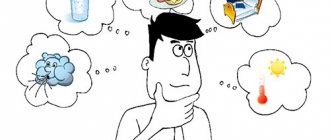Cultural needs
Cultural needs, considered as an integral part of human needs, as a category related to the reproduction of labor power, depend on the degree of development of the production of cultural goods, goods and services. Several areas of cultural needs can be distinguished: artistic and aesthetic, educational, entertainment, recreational and others.
There are many different ways to classify cultural needs depending on the criterion chosen. Let's consider the structure of cultural needs by identifying 4 vertical levels:
First level
includes a wide and traditional range of cultural needs for a certain time, for example, in a certain work culture, education, artistic and aesthetic, recreational, etc.;
Second level
– specifying the areas of needs, identifies types of cultural needs, for example, artistic and aesthetic needs in literature, music, theater, and fine arts are clarified;
On the third level
specific cultural needs are highlighted. For example, theater, as an area of interest, takes on a more clear form of genre: drama, opera, ballet, show program and others;
Fourth level
classification contains individual cultural needs, i.e. at this level, it is not just the need for a certain genre of theatrical art that is classified, but the needs for the services of specific, for example, drama theaters.
Such a classification of cultural needs allows us to build cultural priorities of the population that require their satisfaction. Naturally, cultural industries are engaged in the production of cultural goods.
Culture becomes an independent industry when the scale of expenditure of social labor in a given area of satisfying needs has led to its separation from the sphere of activity with which it was previously functionally connected, for example, with education. The cultural sector gradually acquired independence within the framework of the division of labor and turned into a branch of the national economy.
The functioning of this industry is aimed at creating a product capable of shaping and satisfying the cultural needs of people. These products have specific, sensory properties that enable them to satisfy people's cultural needs.
Sociocultural needs of modern youth
Stepanova Yulia Yuryevna, student of the Novosibirsk State University of Economics and Management, Novosibirsk [email protected] Scientific supervisor: Ilyinykh Svetlana Anatolyevna, Doctor of Sociology. Sciences, Professor, Novosibirsk State University of Economics and Management, Novosibirsk
Sociocultural needs of modern youth
Abstract. The article is devoted to the consideration of the characteristics of the sociocultural needs of modern youth. The author has studied the constituent elements of sociocultural needs and found out why they change. Key words: cultural needs, social needs, sociocultural needs, students, values.
The problem of studying the sociocultural needs of young people is not only quite relevant, but also a poorly studied topic. Sociological knowledge is predominantly dominated by research into either social or cultural needs, which is quite justified. Needs, whether social or cultural, are of particular importance, since they determine the most important aspects of the interaction of individuals, their attitude towards life. Of particular importance is the study of the socio-cultural needs of young people, since this group is an indicator of social changes that occur over time, this is a special community of individuals .In the definition of R.V. Lenkov noted the main features of young people: age limits and status in society, the transition from childhood and adolescence to social responsibility [3]. Needs, including sociocultural ones, are predetermined by the development of new roles for an individual, a high level of mobility, building one’s own family, a change in values, needs, interests, opportunities, career prospects and professional plans, and others. The stage when childhood and adolescence are replaced by a more mature attitude towards life is also characterized by a change value orientations, basic interests, and basic needs that are significant for the individual. For example, young people cease to be hostile to the advice of their loved ones, begin to value their parental family more, and accept their instructions with respect and understanding. This also applies to other changes. Over time, the needs for entertainment are replaced by the needs for education and self-development. The future state of not only the young person himself, but also society as a whole, its transformation, and the future of the entire country depends on the values, interests, needs, and motives of young people. It must be said that value orientations are a reflection in the consciousness of the individual of values that are recognized by him as strategically important life goals, general guidelines for his worldview[2]. Values guide, orient, organize the behavior of individuals, and act as criteria for evaluating the activities of both one’s own and other people. They also act as the basis for assessing and understanding the holistic image of the social world, the world of interactions. Currently, such aspects as values, needs, interests, motives have a dynamic development: needs replace each other, some values become more significant, others completely lose their relevance, interests are constantly changing.
This trend is especially noticeable in the 21st century, when fundamental changes are taking place in the entire social structure, value system, worldviews and other important aspects.
So, for example, the dominance of spiritual values is replaced by the strengthening of the individual’s material values. They become the basis of modern society. Considering the sociocultural needs of young people, we point out that domestic scientists dealt with this issue: L.I. Petrov [4], N.I. Nikiforova [7], R.A. Topchiy [8], E.A. Shmeleva [1] and others. R.V. studied the needs of young people as a special social group. Lenkova [3], T.S. Strunkina [5, 6] and others. Researchers come to the conclusion that sociocultural needs are a synthesis of social and cultural needs. Starting from the basic concept of “need,” we will highlight its most important characteristics. Let's use the definition of T.S. Strunkina, which is given in her work “Sociocultural needs as an object of interdisciplinary synthesis” [6]. The author highlights such aspects of the term. Firstly, these are the objective needs of individuals, necessary for certain conditions that ensure their life and development. Secondly, these are personality properties that determine her relationship to activity. Thirdly, this is the state of the individual’s psyche, which reflects the need for energy and other factors necessary for the functioning of the individual. The presented aspects of the term, in our opinion, fairly broadly reflect the concept being studied. As we indicated above, sociocultural needs are a synthesis of social and cultural needs. L.I. Petrov considers social needs as the need for communication, social services, self-realization, altruism, freedom, friendship, approval of others or the desire for power, etc. [4]. N.I. Nikiforova interprets them as the need for something necessary to support the life and activity of an individual, a social group, and society as a whole [7]. As for cultural needs, they are expressed in the desire for education, the development of artistic values, and spiritual development. N.V. Sharova gives the following definition of cultural needs: these are needs determined by the social nature of man [9]. Such needs appeared as a result of the socio-historical development of human phylogeny. The similarity of social and cultural needs can be noted. Firstly, both of them largely depend on the cultural environment. Secondly, they are closely intertwined with each other. Thirdly, they are associated with social status and level of education, as well as general personal development [1].
But, despite some similarities, differences can be distinguished: social needs can be considered as innate, while cultural ones are formed under the influence of culture, in the process of socialization of the individual, with the help of socialization agents. Thus, the synthesis of social and cultural needs allows us to talk about special needs sociocultural, which, incorporating the social and cultural environment, accompany a person throughout his entire conscious life.
R.A. Topchiy and I.L. Shelekhov gives the following definition of sociocultural needs: these are needs that are characterized by a person’s desire to find a reflection of the culture of society in his being through direct interaction with society [8].
Note, T.S. Strunkina adds that the individual strives to find a reflection of the culture of society in his own life in the process of social interaction [6]. Sociocultural needs determine the direction of further activities of citizens and determine the emergence of such social phenomena as progress, regression, creativity, conformity, etc. [5]. They cover creative, spiritual, ethical , aesthetic aspirations of individuals and, undoubtedly, contribute to its further development. Many of these needs acquire a very changeable nature, being subject to social transformations, new living conditions, level of education, social environment, fashion, modern trends, etc. [1]. They determine the direction of future activities and life.
Such needs change throughout a person’s life as society transforms. For example, we can say that tattooing is a sociocultural need that changes both over time in society (at different times one can observe a change in attitude towards tattoos) and with the age of the individual (young people are more loyal to body art).
The sociocultural need for tattoos also lies in the possibility of self-expression of the individual, in the desire to indicate one’s position, to express one’s individuality. Often the need to get a tattoo is intertwined with the desire to show oneself, one’s attitude to the world. It should be noted that in some cultures tattoos have a special meaning, they have a sacred meaning. I got my first tattoo at the age of 17, when I was leaving to go to university in another city. Mine The tattoo is a phoenix, a symbol of freedom. It means that one of the stages of my life (youth) has ended. I entered adulthood and became independent. Another one of my owl tattoos. The owl is a symbol of wisdom, for me, first of all, in relation to the choice of a life partner (Aurora, 20 years old, student). Passing through the prism of the special worldview of young people, sociocultural needs are firmly based on the values and ideals of young people and make them even more mobile and actively changing . Thus, over time, such a sociocultural need as the desire to adopt the cultural experience of other nationalities, countries, and cultures changes. I used to think that my culture was something uninteresting and outdated. As a teenager, I was in awe of everything foreign: music, films, fashion trends. As I grew older, I realized that “my own does not mean bad”: in my culture there is something that I can be proud of, something that I can appreciate and respect. Of course, it is necessary to adopt cultural experience (within reasonable limits), but other countries also have a lot to learn from us (Elizabeth, 21 years old, student). This need is influenced by public opinion; values, norms, traditions that are present in society; personal experience, worldview of the individual, etc. At one time, people will actively protest against the adoption of any components of another culture; in another they will adopt cultural experience without realizing it as something negative, alien, unpleasant. The individual actively acts on needs, especially sociocultural needs, and takes part in their transformation, and, therefore, he himself improves the culture and social environment. Studying the leading needs of young people in the future will allow us to build a modern model of the preferences of the new society.
So, the sociocultural needs of the younger generation are of particular importance, since they are at the basis of the formation of the individual and society as a whole. Both culture and social environment are the most important factors in the development of an individual, his abilities, values, properties, and sociocultural needs. But just as these aspects influence a person, the individual himself influences them, selectively choosing how to relate to certain stimuli.
Undoubtedly, it should be noted that the individual himself takes part in changing and improving the social environment and culture. The study of basic social and cultural needs, as well as their synthesis, will further allow us to see future changes in the entire society and social environment.
Links to sources 1. Actualization of the potential of sociocultural faith: monograph / ed. E.A. Shmelevoy. Shuya: ShPGU, 2012. 47 p. 2. Efremova T. F. New dictionary of the Russian language / T. F. Efremova. M.: Russian language, 2000. [Electronic resource] URL: https://www.efremova.info/(Date of access: 03/30/16) 3. Lenkov R.V. Sociology of Youth: Textbook for Academic Bachelor's Degree / R.V. Lenkov. M.: Yurayt Publishing House, 2015. 416 p. 4. Petrov L.I. Need as a subject of sociocultural reflection // Omsk Scientific Bulletin. 2012. No. 3. P.238242.5. Strunkina T.S. On the problem of sociocultural needs of youth: philosophical and historical analysis / T.S. Strunkina //Scientific search. 2014. No. 4. P.1622. 6.Strunkina T.S. Sociocultural needs as an object of interdisciplinary synthesis / T.S. Strunkina // Technology Center. 2015. No. 2. 7. Nikiforova N. I. Value orientations of the population of a mono-industrial city: Author's abstract. dis. ...candidate of social sciences. Kazan, 2005 // Electronic library: dissertations. URL: https://diss. rsl.ru (date of access: 04/01/2016). 8. Topchiy R.A. Assessment of primary sources of scientific psychology in the history of world philosophy // Bulletin of Tomsk State University. 2013. No. 6. WITH. 190196.9. Sharova N.V. General psychology: personality psychology / N.V. Sharova. Yaroslavl: YaGPU, 2010. 79 p.
List of used literature
1. Bulgakov S. N. Philosophy of Economics. M. 2003. P. 282.
2. Wundg V. Introduction to psychology. M., 1912, etc. 237 p.
3. Wundg V. Essays on psychology. M., 1913. 125 p.
4. Hegel G. Works, vol. VIII, M., St. Petersburg. 1935. 71 p.
5.Spiritual culture. Encyclopedic edition. Volume
9. Publisher: Balance-Media, 2006. 236 p.
6. Cooley C.H. Human nature and social order. M., 2000. pp. 212-213.
7.Marx K., Engels F. Izbr. prod. in 3 volumes. T. I. 1966. P. 75.
8. Marchenko T.A. Need as a social phenomenon. M. Higher School, 2000. 53 p.
9. Orlov V.S. Man and his needs. Publisher: Peter, 2006. 160 p.
10. Spirin V. M. Theory of needs. Tver, 2004, 143 p.
11. Fromm E. The human soul. M., 2002. pp. 310-311.
12. Fomicheva A.P. Culturology M. Vlados. 2005. 236 p.
13. Janshten R. Spiritual and non-spiritual. SPb.: Rhodes. 45 pp.











